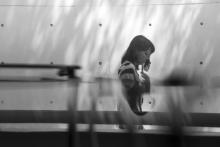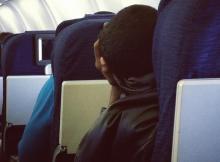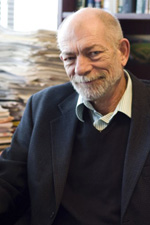perspective

THE DIALOGUES I am having with others in my late 30s are in contrast with the ones I had in my 20s when I was a single suburbanite. ... My aroused feminist perspective tempts me to say that traditional evangelical theology was adequate when I was living with a primarily masculine (in the Jungian sense) orientation to life, but has revealed deficiencies as I have related to life out of a more feminine consciousness.

Christians often talk about actively changing the world, but too often, we just sit still and passively watch the struggles of others without participating, leading, or caring. We don’t love.
Why? Because many Christians have an inability to use their imaginations.
People who can’t imagine are susceptible to bigotry, racism, hatred, and violence toward others. Why? Because they can’t imagine any other scenario, perspective, or opinion other than their own. They have an inability to see themselves in someone else’s shoes. They can’t see beyond their own narrow reality.
When you can’t imagine, you can’t empathize, understand, or relate with the actions, struggles, pain, suffering, persecution, and trials of others — you become apathetic, unmoved, stoic, and inactive.
Whether our differences are gender-related, age-related, race-related, culturally related, politically related, economically related, socially related, theologically related, value-related, or related to any countless number of factors, overcoming them requires imagination.
When you can’t imagine, you can’t celebrate, appreciate, admire, and joyfully love others. You disconnect yourself from humanity.

I don’t know what came over me. Was it what Noel Castellanos (CEO of CCDA) had said? What Jim Wallis (President of Sojourners) had said? Perhaps. I couldn’t keep the tears from coming. Walking up Broadway Street in Los Angeles in the middle of a Saturday afternoon as a crowd of people blew horns, held signs, and chanted, “Immigration reform now,” I wept. It was because of Ivone. I was even wearing my Faith is Greater Than Fear shirt but lurking along the sidewalk, not intending to get involved. But it's too late for that. I love Ivone like a sister, I’m already knee deep in it.
Jim, Noel, and Jenny Yang (World Relief) had just been speaking on a panel at the Justice Conference about immigration reform. Jim said that we had to pass comprehensive immigration reform now, before the summer recess. And I knew in my heart that he was right. Because if we don’t, then Ivone will continue to lie in limbo along with 11 million other aspiring Americans, perhaps being deported in a couple of years. We will both continue to live in uncertainty and fear.

OUR PLANE SITS at the gate in Brussels well past our departure time. Slowly, the empty seats fill with Somali refugees whose flight a day earlier had been cancelled. After a night in the airport, they slide wearily into scattered seats.
Ten years together in a refugee camp in Uganda has melded the group into a close-knit family. What do they feel now, I wonder, knowing that on the other end of this flight they will scatter, not to empty seats but to unknown cities throughout the U.S.? From Syracuse to San Francisco, they will look upon a world they have never imagined. “When will I see my friend?” one little girl asks, not realizing she and her friend will live half a continent apart.
I watch a man a few rows ahead of me. I learn from his friend that he suffers from headaches. I know enough about refugees to realize headaches will likely be the least of his challenges. He and his family will face a confusing culture, strange language, unfamiliar religious practices, unknown yet required skills, and new technology—from flush toilets to garage door openers, from light switches to iPads. Then they’ll have to sort out schools and jobs and health care. They’ll be starting over, basically, with nothing.
Almost nothing. One suitcase per person contains the bit of their past they carry into their future. These slim and elegant humans are traveling very light. Unless, of course, you count the weighty baggage of war and displacement.

Autumn mornings -- when the cool rain is hitting the tin roof and the breezes blow with enough swagger to make the trees bow in admiration -- remind me of when my second daughter was born and after we had held her in our arms for some time we knew exactly what her name would be. Jorah (meaning "autumn rain" in Hebrew.)
I cannot help but reminisce about those summer sunsets (pictured above) when the sweaty warmth stretched late into the day. Those days were full of bold, luminous life. A bountiful garden. Happy hens sauntering. Silly children splashing and running and laughing.
During the summer season, my wife's delicate hands turned, with soil under her nails and calluses here and there from hours of loving toil in the garden -- always walking towards me with a bowl full of color and a mouth cracked open by a proud grin. She mothers the vegetables in her with almost as much attentiveness and love as her own babes.
Now autumn's crisp air awakens us as we feel the seasons shifting. The trees cast all their energy into turning shades of green into glorious reds, yellows, oranges and golds, a celebratory finale before bowing out for a season of slumber.
On the morning of September 11, 2001, I was standing in the bathroom of my apartment outside Chicago, about to hop in the shower, when I heard the phone ring and then my husband call my name.
"It's Roger from the desk," he called, sleepily, invoking the name of the morning assignment editor at the Chicago Sun-Times where I was a reporter at the time.
I padded down the hallway in my pajamas to the living room and picked up the phone.
"How quickly can you get down here," Roger asked.
"I dunno, an hour, maybe," I said. "Why? What's up?"
"A plane hit the World Trade Center in New York," he said. "They think it's a terrorist attack."
So let me suggest that this Labor Day, the church cannot afford to perpetuate the labor movement as an unexamined challenge in our society. Debates about the role of unions are everywhere, and demand thoughtful theological discussion, consideration, and action.
This Labor Day weekend, we are challenging every congregation and faith community in Ohio and around the nation to devote a portion of your worship service to exploring a biblically informed perspective on labor. This could include part of a homily, a testimony, a time of prayer for labor members in your parish, church, or faith community, or hosting a special conversation or panel on issues of faith and labor.
 My office has two overflowing bookshelves, with more books stacked on top and on the windowsill. But above my desk within easy reach is a small shelf. On it I keep those books I most regularly use in thinking and writing. Here are the top 10.
My office has two overflowing bookshelves, with more books stacked on top and on the windowsill. But above my desk within easy reach is a small shelf. On it I keep those books I most regularly use in thinking and writing. Here are the top 10.
1. The Bible: What can I say about the foundational source of God's guidance in everything? I read or refer to it nearly every day. It was given to us "for teaching, for reproof, for correction, and for training in righteousness" (2 Timothy 3:16).
2. The Book of Common Prayer: I am not Anglican/Episcopalian, but there is something in the formal prayers of the traditional liturgy that resonate with my soul. On those days I really don't feel like praying or can't find the words, it's comforting to have a place to turn for inspiration.
The way you think and feel about the world is shaped by what you see when you get out of bed in the morning. I remember hearing this from civil rights activists. It simply means that perspective is hugely determined by place, context, and vantage point. This is profoundly true for me and most of the people I've ever met. You see the world from the place you live.
Part of the problem in the current budget impasse in Washington, D.C. is the perspectives of the politicians in the debate. Every morning they see and hear each other; the gladiator ring of national politics; the Washington media; their donors; their ideological base; and their latest poll ratings.
What is wrong with the typical photo of world leaders making decisions for their countries? The general absence of women -- at the table, in the room, and, as a result, from the agenda.
Yesterday was Father's Day. As a favor to a dear friend, I did a speaking event on Saturday night away from home, and planned on returning very early in the morning for Sunday and Father's Day.
Some controversy has arisen about an ad campaign that a new coalition wanted to run in Sojourners on the issue of the LGBTQ community and the church. We chose not to run the ad as this is an issue we want to openly discuss on and through our editorial pages and not through our ad space. Like the larger church, Sojourners' constituency, board, and staff are not of one mind on all of these issues. However, we at Sojourners seek to foster honest, fair, and loving dialogue among Christians. LGBTQ issues may not be our primary calling as our work against poverty and hunger, and for peace, but based on some reactions to our decision, I want to use this as an opportunity to clarify the positions and practices of Sojourners on this important discussion on the life of the church in the early 21st centur
My family, while I was growing up, was not much for spring breaks. As other families we know flitted about preparing for palm trees and sand, my sister and I would pout and lament to my mother that we had the worst lives on the planet because we were not going to Florida. My Mom (and I now love her for this) really didn’t care. Her basic attitude was that we had more than enough adventure in our lives so suck it up and stop whining. Call another friend who stayed home and get out of the house.
Erica Chenoweth directs Wesleyan University's program on terrorism and insurgency research, which she established in 2008. Her work will be featured in the upcoming May issue of Sojourners magazine. Erica is doing innovative research on the strategic effectiveness of civil resistance and nonviolent revolution. Recently, she wrote a post at Monkey Cage on why traditional "peace and security" academic programs should include nonviolence and civil resistance tactics as part of their programs. "It is time for security studies to take nonviolent conflict seriously," writes Chenoweth, "and to incorporate such episodes and their dynamics into the canonical literature."
In November, 2010, Marine 2nd Lt. Robert M. Kelly was killed by a landmine in Afghanistan. He became one of now nearly 1,500 young Americans to die there.
Growing up in the Bible belt in east Tennessee, I can remember an entire campaign built around "What Would Jesus Do?" There were WWJD bracelets, stickers, and T-shirts everywhere.